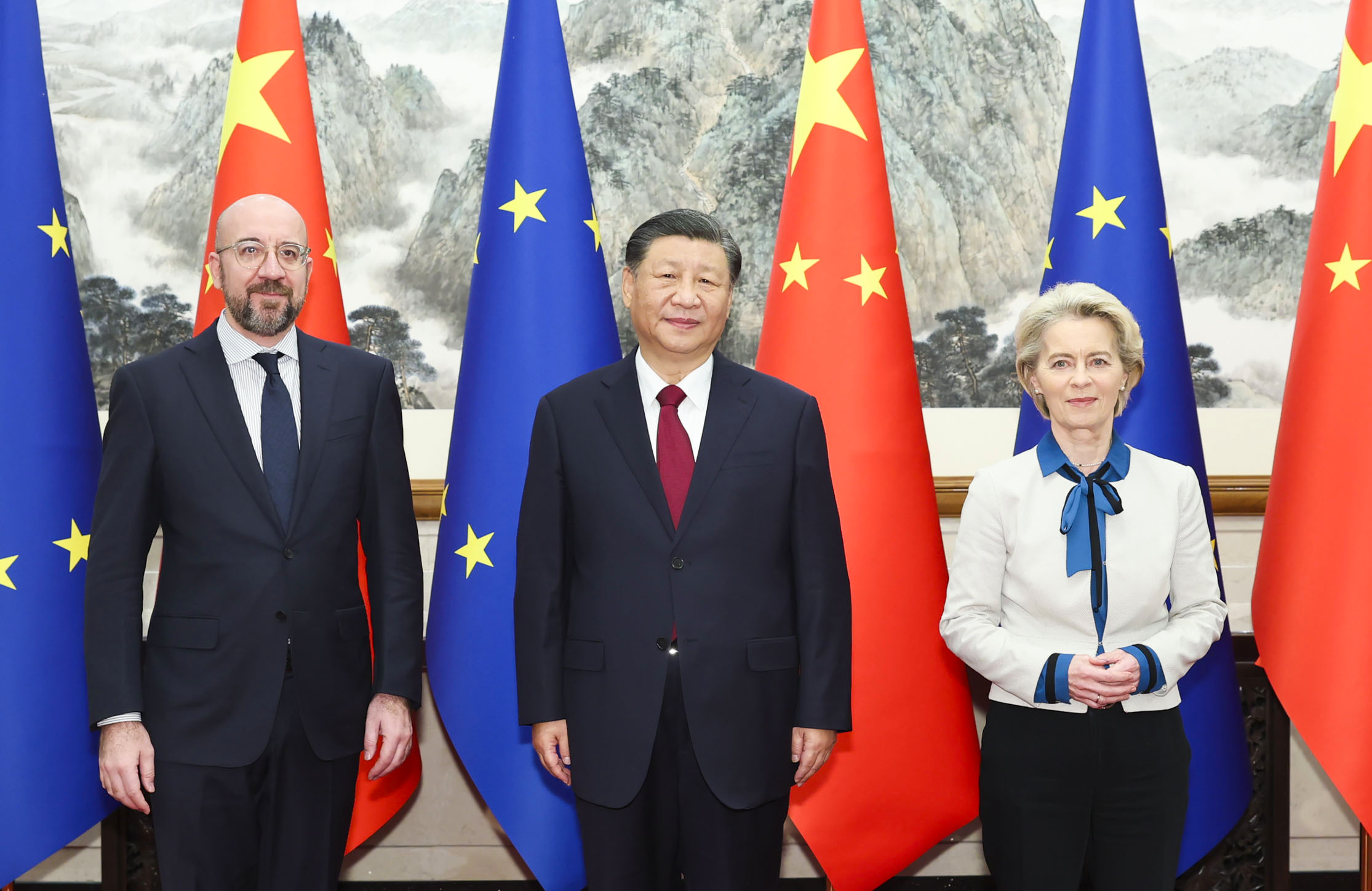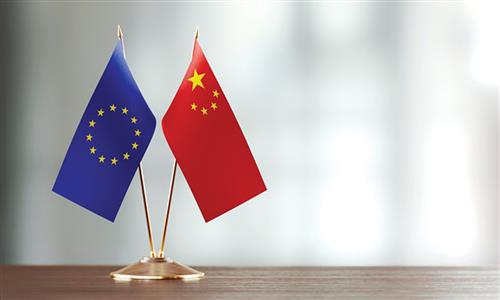
Chinese President Xi Jinping meets with visiting President of the European Council Charles Michel and President of the European Commission Ursula von der Leyen on December 7, 2023 in Beijing. Photo: Xinhua
Chinese President Xi Jinping on Thursday met with top EU officials in Beijing and stressed that China and the EU should be partners for mutually beneficial cooperation, strengthen two-way political trust, build strategic consensus, cement the bonds of shared interest, eliminate various kinds of interference, and jointly tackle global challenges.
Xi made the remarks when meeting with President of the European Council Charles Michel and President of the European Commission Ursula von der Leyen, who are in China for the 24th China-EU Summit at the Diaoyutai State Guesthouse in Beijing.
Xi said that since the end of last year, the China-EU relationship has shown a good momentum of consolidation and growth, and the China-EU high-level dialogues in the strategic, economic and trade, green, and digital fields have produced rich outcomes, adding this serves the interests of both sides and meets the expectations of their people.
Noting China and the EU are two major forces advancing multipolarity, two major markets in support of globalization, and two major civilizations championing diversity, Xi said that amid the increasingly turbulent international situation, the China-EU relationship has strategic significance and implications for global peace, stability and prosperity.
"It is incumbent on both sides to provide greater stability for the world and stronger impetus for development," he said.
"China and the EU should be partners for mutually beneficial cooperation," said Xi. He called on both sides to continually strengthen two-way political trust, build strategic consensus, and cement the bonds of shared interest. The two sides should steer clear of various kinds of interference, step up dialogue and cooperation for the good of our people, and join hands to tackle global challenges and promote stability and prosperity around the world, he added.
According to the readout from Chinese Foreign Ministry, the EU leaders said the EU highly values its ties with China, and does not want to decouple from China. It seeks a long-term, stable, predictable and sustainable relationship with China, and hopes that the EU-China Summit will help reenergize EU-China relations.
The EU side also expressed the hope that the two sides will continue to strengthen dialogue and cooperation in the economic and trade, green, and digital fields, work together to keep supply and industrial chains stable and secure, and strengthen dialogue and cooperation on major global issues concerning the future of humanity, such as climate change and artificial intelligence.
The EU leaders said Europe is prepared to increase communication and understanding with China in a mutually respectful, open and candid spirit on issues where they disagree. The EU would like to have close communication and coordination with China, uphold multilateralism and the purposes and principles of the UN Charter, and work for the settlement of regional hotspots including Ukraine and the Middle East.
The EU recognizes that dialogue and cooperation with China is indispensable, whether it's in trade and investment, the EU's own economic development or global stability, Zhang Jian, vice president of China Institutes of Contemporary International Relations, told the Global Times.
"These are all positive signals, indicating that the EU may move back to the track of cooperation and mutual benefit in its relations with China," he noted.
Crucial exchanges at a crucial time
The summit this year coincides with the 20th anniversary of the China-EU comprehensive strategic partnership and the 25th anniversary of the China-EU Summit mechanism.
China and the EU resumed high-level exchanges in the post-COVID period at the end of 2022 and maintained the momentum of engagement as leaders and officials from EU countries visited China over the year. Chinese Premier Li Qiang also visited Germany and France in June. Meanwhile, China-EU high-level dialogues in the fields of environment and climate, digital, economy, trade and strategy have been held successfully, and consultations in various fields have been advanced.
Feng Zhongping, director of the Institute of European Studies at the Chinese Academy of Social Sciences, sees the timing as having a special significance for the direction of the future development of China-EU relations.
Both sides attach great importance to the summit and expect the meetings to promote stability in China-EU relations while not circumventing problems but seeking solutions, which is a positive breakthrough, Feng told the Global Times.
Leaders' remarks from both sides conveyed the signal that China-EU relations should not only be stabilized but also moved forward, said Cui Hongjian, a professor with the Academy of Regional and Global Governance with Beijing Foreign Studies University.
Considering that face-to-face meetings between Chinese and European leaders have been lacking in recent years, the summit is certainly a critical exchange at a crucial time, Cui said.
Chinese Foreign Ministry spokesperson Wang Wenbin said on Thursday that the contact between the leaders of China and the EU was very meaningful, and both sides sent a positive signal of pushing forward the further development of China-EU relations with joint efforts.
Common interests outweigh divergence
Like the Xi-Biden meeting in San Francisco, which largely eased strains between the world's two major powers in November, no joint statement was released after the meetings.
At a joint press conference by von der Leyen and Michel on Thursday evening, EU leaders mentioned touchy issues between the two sides, including the "trade imbalance" and the stance on the Ukraine crisis, in a candid and frank way. They also emphasized that the EU has no intention of "decoupling" with China and hailed China's role in climate change and green energy.
During the meeting with top EU officials on Thursday afternoon, Chinese Premier Li Qiang said China stands ready with the EU side to adhere to seeking more common ground while reserving differences, strengthen mutually beneficial cooperation and multilateral coordination, and further enhance the stability, constructiveness and mutual benefit of China-EU relations.
Premier Li also noted China opposes the politicization of economic and trade issues, and hopes that the European side will be prudent in introducing restrictive economic and trade policies and the use of trade remedies. His words alluded to Beijing's recent opposition to the EU's so-called anti-subsidy probe into electric vehicles (EVs) from China.
There are differences between China and Europe, but the common interests between the two far outweigh the differences, Li Haidong, a professor at the China Foreign Affairs University, told the Global Times on Thursday.
There is no reason why China-EU cooperation, with its wide scope and solid foundation, should not take advantage of this year's most important diplomatic event between China and Europe to further advance cooperation and strategic coordination, Li Haidong said.
There are strong economic and strategic complementarities between China and Europe, and both sides have expressed a willingness to cooperate, so the next coordination, even if it is tortuous, will be a process of moving forward, Li Haidong added, "a stable China-EU relationship will be a stabilizer in the current uncertain international landscape."
Due to the absence of a joint statement, which some media revealed in advance, some Western media outlets said the China-EU summit can hardly deliver substantial results while disputes still remain.
The AFP described the summit as one with "high stakes but low expectations," while Reuters also remarked that the summit had "limited expectations" and was "short on outcomes." Some media said even before the summit that EU leaders plan to take a firm stance over certain sticking points, including trade disputes, human rights, and the Ukraine crisis.
Divergences between China and Europe on issues of economic globalization and international security cannot be solved through merely one summit, but it can at least convey the two sides' willingness to overcome these obstacles, Feng said, "Approaches like decoupling, de-risking won't solve the problem."
"We took a deep dive into our economic and trade relations. Together we will work on rebalancing our trade relations and resolve irritants," von der Leyen said in her X post.
Some Western media have taken up the baton of the US' strategic competition with China and sought to put any coordination and cooperation between China and Europe on the track of confrontation, but reality will give a loud rebuke to these people who downplay China-EU ties, Li Haidong said.


